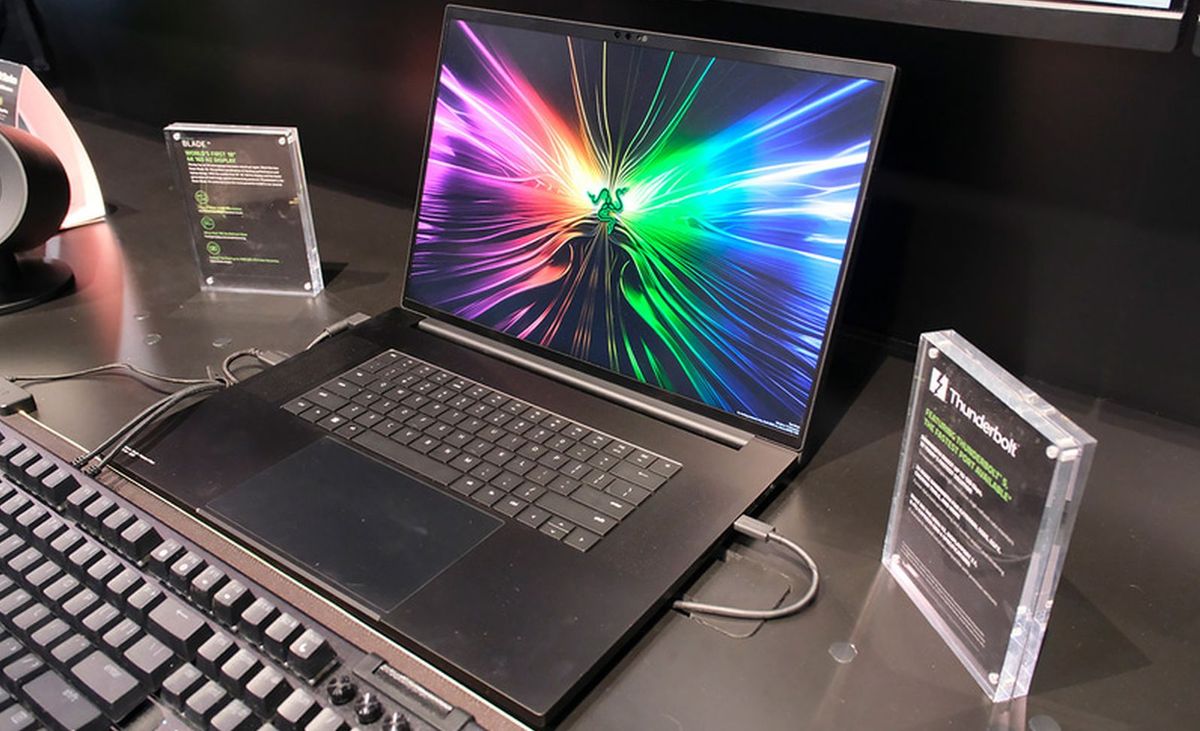The 2024 edition of the Razer Blade 18 gaming laptop was announced a few days ago at CES 2024 and photos of the beast have circulated online (here, here and here), showing the annual refresh of the popular DTR (desktop PC replacement) laptop is a substantial one.
While its primary market is – and remains – gamers, there’s no denying that the complete package will appeal to creatives and even further afield, for a number of reasons; a mobile workstation to rule all mobile workstations?
Unlike quite a few of its competitors (Asus ROG Strix Scar 17, MSI GT77 Titan, Lenovo Legion 7i Pro) the Razer Blade 18 doesn’t look like a gaming laptop at all. In fact, it wouldn’t look out of place at all in an executive leadership team meeting in an anonymous London-based boardroom. With its lack of a dedicated keypad, a long hinge and brushed metal finish, it looks more like a 16-inch Apple MacBook Pro albeit at almost twice the weight.
Then there’s the Thunderbolt 5 (TB5) connector, capable of delivering a bandwidth of 120 Gbps, and is more useful for content creators than gamers. Razer’s own marketing literature refers to “faster data backup/archiving and quicker export and rendering” thanks to twice the amount of bandwidth for external SSD, external GPU and other creator tools. I have seen a number of docking stations (e.g. J5 Create) and portable SSD (e.g. OWC) that support TB5 at CES 2024; expect that number to grow this year.
Workstation-class specifications
Thunderbolt 5 also supports refresh rates of up to 540 Hz at low resolutions, 144Hz on three 4K monitors, up to two 8K monitors and a single 10K/16K display, the latter probably at 30Hz (ed: still haven’t seen a single mainstream 8K monitor on sale yet for the past few years, so won’t hold my breath for a 16K one).
If the specs of the smaller Razer Blade 16 are the same for its bigger brother, expect a 14th generation Intel Core i9 CPU (14900HX) and a desktop-grade Nvidia RTX 4090 with a 175W TDP. Based on Geekbench benchmark CPU test results, I expect the 14900HX – which Intel calls the world’s fastest mobile CPU – to be competitive with crème-de-la-crème from AMD (within a similar power envelope).
And in a thinly-veiled nod to content creators and professionals, it almost certain that – based on the current specs of its 2024 16-inch brethren – the new Razer 18 will come with up to 8TB SSD and 96GB of RAM, a very significant boost from its 2023 version which could only muster 32GB of RAM and 2TB SSD, enough for gamers but not for Pros. Expect to pay north of $5,000 (about £4,000, AU$7,500) just for these two upgrades though, basically doubling the price of the base configuration.
It’s not the perfect mobile workstation though, let’s not kid ourselves. It doesn’t offer Windows 11 Pro by default, comes with 12 months warranty only with no option for longer periods or onsite warranty. There’s no numeric keypad, a must for pros, there’s no fingerprint reader or support for vPro, Intel’s management platform.
Still, I would gladly put it in our best laptop for engineering students or best laptop for video editing buying guides when it goes on sale later this year.





